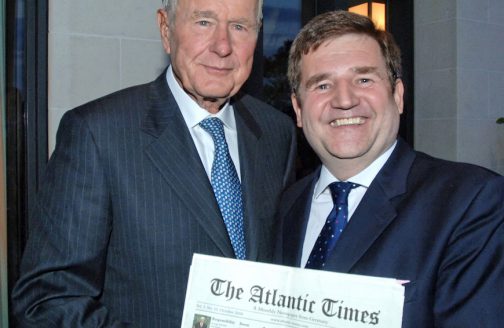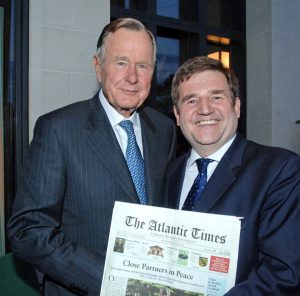Thank You, Mr. President! An obituary for the 41st US President, George H.W. Bush

With the passing of George Bush the elder, Germany has lost a loyal friend and a committed champion of freedom across the globe. One of the great transatlanticists and an architect of German Reunification, the former US president will always occupy a special place in our history books.
Although he may have be no Abraham Lincoln, or George Washington, or Franklin D. Roosevelt, or even Ronald Reagan, he was a president of consequence and a man who made history.
As George H.W. Bush took office as the 41st president of the United States, the world was undergoing a dramatic transformation. The geostrategic upheavals in the Middle East and in Europe required a diplomat like Bush, who would go on to meet these unprecedented challenges with prudence and prowess.
George H.W. Bush was an experienced politician who, with cultivation and tact, did his best throughout his career to prepare for the office of the presidency. He understood how to wield the global responsibility shouldered by the United States of America without snubbing or belittling his country’s closest partners and friends. Bush embodied the principles of international cooperation.
We Germans and we Berliners owe George H.W. Bush a particular debt of gratitude. Bush saw to completion what his predecessor Ronald Reagan had set in motion in the 1980s: the peaceful termination of the Cold War, and with it the decisive victory of freedom over communism and totalitarianism.
If not for President Bush, 1990 would have passed without German Reunification. Confronted with apprehensive allies such as Great Britain and France as well as one wary foe, the Soviet Union, he was resolute in pressing ahead with German Unity. After all, because he trusted the new modern Germany that had overcome the darkest chapter of its past to become a valued Western ally, he was convinced that a reunified Germany would pose a threat to no one. Indeed, he offered the Federal Republic of Germany “partnership in leadership.” The Germans were to become America’s partner in leading the Western world, a role that Germany wrangles with still today, despite the lack of any real alternative. His message of yesteryear remains our mission today: we must help shape affairs in the European context, not govern them.
But it was not only with Germany that Bush sought to engage on equal terms. German Reunification would soon be followed by the collapse of the Soviet Union and its entire sphere of influence, and again Bush would remain calm and refrain from howls of triumph in the face of Moscow’s defeat. As he made clear at the time, he had no plans to “dance on the Wall.” Bush sought not to discourage America’s Eastern foes from becoming partners; he saw them as potential allies in a post-Cold War world. He developed a trusting cooperation with Gorbachev, which facilitated Russia’s tolerance for Germany’s inclusion in NATO. It was nothing short of a political and diplomatic tour de force. His German counterpart, Helmut Kohl, would prove to be just the right partner for such a scenario. Bush worked in concert with Kohl to quell the hesitations of their other allies, not only concerning the question of German Reunification, but also in terms of championing a Euro-Atlantic security architecture in which Moscow would stand on equal footing. Especially today do we rue the fact that this forward-thinking vision remained unrealized. The spirit of Bush, his farsighted perspective forged by the pragmatism and the – in equal parts – courage and trust found in most political protagonists of his day, is sorely missed at this fragile moment, in which peace in Europe and beyond is again in jeopardy.
His statesmanlike commitment to a liberal world order has made him one of our time’s most important protagonists of the trans-Atlantic community of shared values. Unilateral action was something foreign to him. His focus lay always on the inclusion of partners; he believed in the potency of multilateralism. And he understood, as exemplified by his preparations for the first Gulf War, that going it alone can result in the destabilization of an entire region – a sensibility unfortunately not shared by all of his successors in office.
In US President George H.W. Bush, we are losing the certain sort of statesman who embodies that prudence, courage, humility and foresight sadly lacking in many of today’s world leaders. We are now bearing witness to the opposite of the political credo that he proclaimed in January 1989 at his inauguration as the 41st president of the United States of America: The US as a superpower will strive to be a kinder, gentler nation. Bush combined this aspiration with his global vision of peace, liberty, democracy and dialogue. It is his legacy that now, more than at any other time in recent history, we must defend against the propagation of an illiberal world order.
It was America’s domestic and economic affairs during his term in office that would deliver him a fate he shares with other great political architects of the 20th century, such as Winston Churchill – after four years in office he was forced to concede defeat to a younger rival, Bill Clinton, who embodied the upheaval in a new America just as Barack Obama would 16 years later. For us Germans, in any case, it was fortuitous that in George H.W. Bush we had the right man at the right time pulling the levers of power for the Western world. Without him, Germany would not have been able to find its way to reunification with so little friction. Indeed, he shepherded us over rocky terrain and remains a beacon of good fortune for our country and for all Germans. His legacy is still felt today. We bow in gratitude to him for his long life of political achievement.
George H.W. Bush was a great statesman whose qualities and principles of justice are circumscribed with concepts that have become all too seldom in modern-day politics: modesty, respect, dignity, humility, foresight, prudence, but also courage and resolve under historically unique circumstances. Along with his Soviet counterpart in the waning days of the Cold War, Mikhail Gorbachev, he was perhaps the towering figure of the last decade of the previous century, an almost forgotten time we recall with ever more longing, as it was marked by an abundance of trust between the leaders of the world’s two superpowers, and an equally significant lack of triumphal gesture. After all, he knew that at stake in these decisive years of history was not only the unification of Germany and of the continent, but nothing less than the freedom of people all across Europe, as well as the founding of an enduring peace for the entire Euro-Atlantic realm. Today, we Germans and we Europeans are painfully aware that George H.W. Bush was perhaps the last truly trans-Atlantic US president we will witness.
Prof. Wolfgang Ischinger is chairman of the Munich Security Conference (MSC). He has served as deputy foreign minister for Germany as well as the German ambassador in Washington, DC. As a close associate of Foreign Minister Genscher and later as ambassador to the US, he had numerous encounters and personal conversations with George H.W. Bush.
Prof. Detlef Prinz is the publisher of the English-language newspapers The Security Times and The German Times – A Trans-Atlantic Newspaper. He also looks fondly back on his many personal encounters with the 41st US president in Berlin and in the United States of America. This article is in acknowledgment and honor of both the life and political engagement of George H.W. Bush.

Foto Credit: Washington, D.C., October 3, 2006: Detlef Prinz presenting George H. W. Bush with the latest edition of The Atlantic Times. (Photographer: Christian Kruppa for The Atlantic Times)

